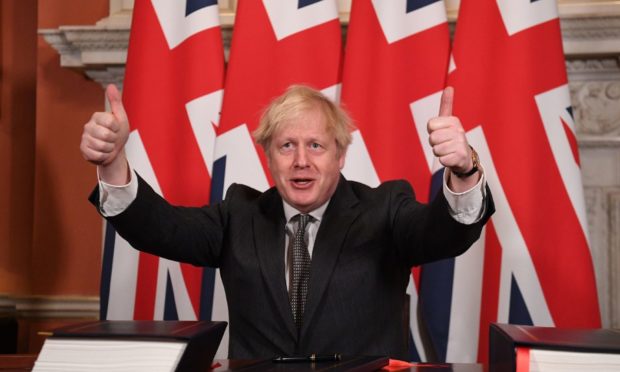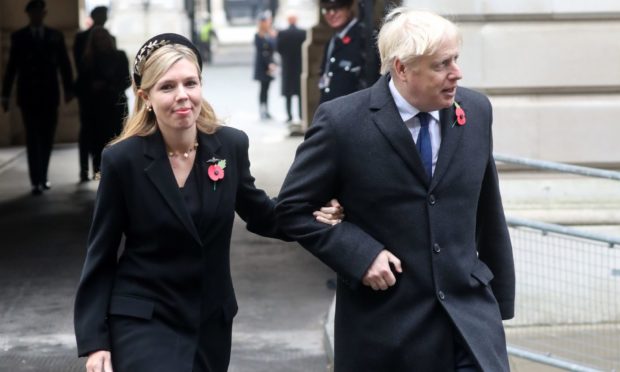So, Boris Johnson had a ruling against him in the county court last week for an unpaid debt of £535.
It might once have seemed embarrassing for a Prime Minister but Boris always manages to buck that boring outcry stuff.
In fact, a professor at the London School of Economics recently suggested that people don’t care about Johnson’s flat renovations, free Caribbean holidays, or even his propensity for being a bit liberal with the truth because these little hallmarks are interpreted as a sign of his “authenticity”.
Well, quite. But authentic what? Conman? Clown? That hair is part of a costume, surely?
Alarmingly, the professor is right. Johnson stumbles and stammers his way through excuses that make a schoolboy’s: “Miss, the dog ate my homework” look like an application for Mensa.
A roguish twinkle, a dismissal of what he calls a “farrago of nonsense”, and the nation winks back.
Oh Boris, stop it. Come here. Let me comb your hair. Look at that stain on your jacket! Tongue out, there’s a good boy.
Indulgent nonsense normally reserved for naughty, tousle-haired three-year-olds. Which, come to think of it…
While Boris decorates people on benefits are dying
Timing is everything. The political backdrop recently has been sleaze: the holidays, the debt, the titbits in Tatler magazine about how Johnson and his partner, Carrie Symonds, supposedly wanted to transform the Downing Street flat that taxpayers afford them – ridding themselves of Theresa May’s “John Lewis furniture nightmare” – and turn it into a “high society haven”.
So the news that an investigation is now under way into the deaths of people on benefits makes my pulse quicken.
Philippa Day death: family launches legal challenge against DWP https://t.co/GzyEFTjpQv
— The Guardian (@guardian) May 10, 2021
People like Philippa Day, a mentally ill single mother who overdosed in 2019 after trying to get her benefits reinstated.
Her family claim her treatment by the Department for Work and Pensions (DWP) and Capita (a private firm that carries out assessments) was negligent and breached her human rights.
The coroner has issued the DWP with a rare “prevention of future deaths” notice, demanding improvement in the way they deal with mentally ill patients.
Our PM is the definition of a sponger
Meanwhile, Boris dismisses financial accusations with the kind of vocabulary that makes you think Russell Brand was just appointed prime minister.
Listen, I’m a writer. I love a good word. Farrago is a belter, for sure. But there’s another word I think we should examine very closely.
It may not have the drama of farrago, or indeed the rolling elegance of it, but on close examination I think it bears fruit. Let’s look at “sponger”.
‘Sponger’, it seems now, can be just as accurately applied to Downing Street wasters
Sponger carries lots of connotations. Scrounger. Parasite. Hanger-on. Passenger. It’s a word often used for people on benefits.
Spongers, according to stereotypical notions, reside in rundown council estates, have 10 weans (some prime ministers have similar alimony problems), two German shepherds and a wardrobe of shell suits.
They live off white bread and beans but milk enough taxpayer dosh to smoke 20 cigarettes a day with a bottle of Buckie for weekends.
Spongers, apparently, drain the system instead of getting off their backsides and doing it for themselves.
That, of course, would assume that they have a choice: an array of unused skills and an employment market waiting to embrace them.
“Sponger”, it seems now, can be just as accurately applied to Downing Street wasters.
Caribbean holiday? “Yes, someone paid the £15,000 bill, but I’m not sure who.”
Renovations? “Eh… paid for myself. Eventually. When found out.”
Turning a blind eye to the sleaze of the wealthy
The DWP has carried out 84 “internal process reviews” since 2015, with another six pending, but records prior to that have mysteriously disappeared.
The victims are the kind of people so unfairly dismissed as spongers. People who are struggling because they don’t have a job with a convenient flat thrown in, or wealthy friends to give them freebie holidays, or donors who care enough about their personal comfort to suggest they chuck the charity shop cushions and buy some Farrow & Ball heritage paint.
“Move along! Nothing to see,” boomed Boris, sounding about as convincing as a child with a chocolate-smeared mouth who insists he hasn’t been near the cookie jar.
“All nonsense!”
What is nonsense is a nation tolerating benefits claimants in such despair that they commit suicide, while turning a blind eye to the sleaze of the wealthy.
The electoral commission has launched an investigation into the Downing Street refurbishment, saying there are “reasonable grounds” to suspect offences have been committed.
But if those offences are confirmed, will anyone in Britain care? Or will they just be another sign of Boris’s “authenticity”.
A farrago of nonsense indeed.
Catherine Deveney is an award-winning investigative journalist, novelist and television presenter.


